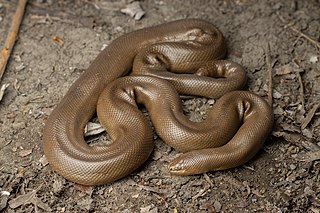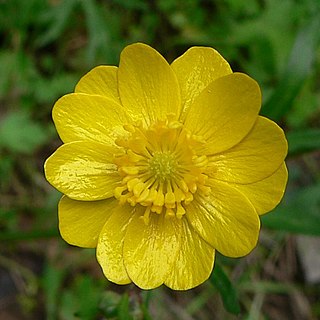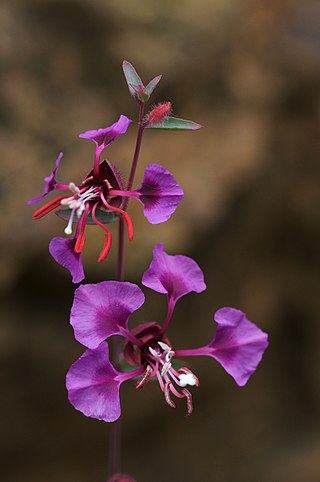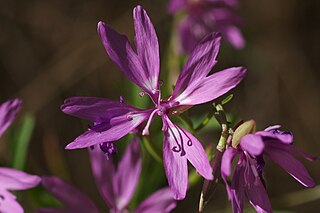
Paul-Émile Botta was an Italian-born French scientist who served as Consul in Mosul from 1842, and who discovered the ruins of the ancient Assyrian capital of Dur-Sharrukin.

Clarkia is a genus within the flowering plant family Onagraceae. Over 40 species are currently classified in Clarkia; almost all are native to western North America, though one species is native to South America.

Clarkia amoena, commonly known as farewell to spring, godetia, or satin flower, is a species of flowering plant native to western North America. It is found in coastal hills and mountains from British Columbia south to the San Francisco Bay Area of California.

The rubber boa is a species of snake in the family Boidae and is native to western North America. It is sometimes known as the coastal rubber boa or the northern rubber boa and is not to be confused with the southern rubber boa.

Ranunculus californicus, commonly known as the California buttercup, is a flowering plant of the buttercup family Ranunculaceae. It is a native of California, where it is common in many habitats, including chaparral and woodlands.

Botta's pocket gopher is a pocket gopher native to western North America. It is also known in some areas as valley pocket gopher, particularly in California. Both the specific and common names of this species honor Paul-Émile Botta, a naturalist and archaeologist who collected mammals in California in 1827 and 1828.

Clarkia is a small unincorporated community in the southwestern corner of Shoshone County, Idaho. It is surrounded by publicly and privately managed forest lands of Douglas-fir, Ponderosa Pine, and Western Larch. Located just to the east of State Highway 3, the town is in the drainage area of the West Fork of the St. Maries River.
Godetia may refer to one of several wildflowers native to the western United States:

Kobayashi's bat is a species of bat. An adult Kobayashi's bat has a body length of 6.0–6.3 centimetres (2.4–2.5 in), a tail length of 4.6–4.8 centimetres (1.8–1.9 in), and a wing length of 4.5–4.7 centimetres (1.8–1.9 in). The species is found only on the Korean Peninsula; it has been suggested that it may be a local form of Eptesicus bottae, Botta's serotine.

Eptesicus is a genus of bats, commonly called house bats or serotine bats, in the family Vespertilionidae. The genus name is likely derived from the Greek words ptetikos 'able to fly' or petomai 'house flier', although this is not certain.

Clarkia rubicunda is a flowering plant endemic to California. It is found mostly on the Central Coast part of the state. The plant is known by the common names Ruby Chalice Clarkia and Farewell to Spring.
Botta's serotine is a species of vesper bat, one of 25 in the genus Eptesicus. It is found in rocky areas and temperate desert.

The buff-breasted wheatear, also known as Botta's wheatear or the red-breasted wheatear, is a species of bird in the Old World flycatcher family Muscicapidae. It is endemic to the Asir Mountains. The species is named after Paul-Émile Botta.

Clarkia unguiculata is a species of wildflower known by the common name elegant clarkia or mountain garland. The plant was named after Captain William Clark who was part of the Lewis and Clark Expedition.

Valtteri Viktor Bottas is a Finnish racing driver, who most recently competed in Formula One from 2013 to 2024. Bottas twice finished runner-up in the Formula One World Drivers' Championship in 2019 and 2020 with Mercedes, and has won 10 Grands Prix across 12 seasons.

Clarkia biloba is a species of flowering plant in the evening primrose family known by the common name twolobe clarkia and two lobed clarkia.

Alypia mariposa, the mariposa forester, is a moth of the family Noctuidae. The species was first described by Augustus Radcliffe Grote and Coleman Townsend Robinson in 1868. It is found in Coast Ranges and Sierra foothills of California, from Kern and San Luis Obispo counties in the south to Placer County in the north.

Frank Harlan Lewis was an American botanist, geneticist, taxonomist, systematist, and evolutionist who worked primarily with plants in the genus Clarkia. He is best known for his theories of "catastrophic selection" and "saltational speciation", which are closely aligned with the concepts of quantum evolution and sympatric speciation. The concepts were first articulated in 1958 by Lewis and Peter H. Raven, and later refined in a 1962 paper by Lewis in which he coined the term "catastrophic selection". In 1966, he referred to the same mechanism as "saltational speciation".

Eptescini is a tribe of bats in the family Vespertilionidae. This tribe has a cosmopolitan distribution.
Ognev's serotine is a species of vesper bat found in western and central Asia.
This page is based on this
Wikipedia article Text is available under the
CC BY-SA 4.0 license; additional terms may apply.
Images, videos and audio are available under their respective licenses.

















